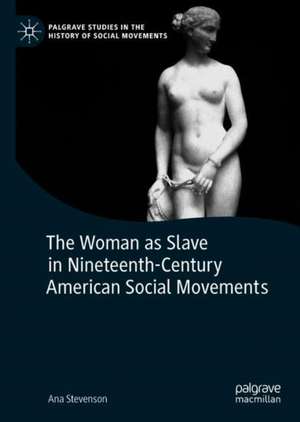The Woman as Slave in Nineteenth-Century American Social Movements: Palgrave Studies in the History of Social Movements
Autor Ana Stevensonen Limba Engleză Hardback – 4 feb 2020
| Toate formatele și edițiile | Preț | Express |
|---|---|---|
| Paperback (1) | 698.30 lei 6-8 săpt. | |
| Springer International Publishing – 26 aug 2021 | 698.30 lei 6-8 săpt. | |
| Hardback (1) | 709.58 lei 6-8 săpt. | |
| Springer International Publishing – 4 feb 2020 | 709.58 lei 6-8 săpt. |
Din seria Palgrave Studies in the History of Social Movements
- 18%
 Preț: 783.98 lei
Preț: 783.98 lei - 9%
 Preț: 833.83 lei
Preț: 833.83 lei -
 Preț: 425.20 lei
Preț: 425.20 lei -
 Preț: 385.08 lei
Preț: 385.08 lei - 18%
 Preț: 790.28 lei
Preț: 790.28 lei - 15%
 Preț: 583.93 lei
Preț: 583.93 lei - 18%
 Preț: 737.12 lei
Preț: 737.12 lei - 15%
 Preț: 698.30 lei
Preț: 698.30 lei -
 Preț: 414.80 lei
Preț: 414.80 lei -
 Preț: 385.25 lei
Preț: 385.25 lei -
 Preț: 418.45 lei
Preț: 418.45 lei - 15%
 Preț: 590.63 lei
Preț: 590.63 lei - 18%
 Preț: 896.84 lei
Preț: 896.84 lei - 18%
 Preț: 735.38 lei
Preț: 735.38 lei - 18%
 Preț: 782.87 lei
Preț: 782.87 lei -
 Preț: 384.48 lei
Preț: 384.48 lei -
 Preț: 384.09 lei
Preț: 384.09 lei - 18%
 Preț: 953.03 lei
Preț: 953.03 lei - 18%
 Preț: 731.28 lei
Preț: 731.28 lei -
 Preț: 483.70 lei
Preț: 483.70 lei - 18%
 Preț: 786.04 lei
Preț: 786.04 lei -
 Preț: 451.10 lei
Preț: 451.10 lei - 15%
 Preț: 592.12 lei
Preț: 592.12 lei - 15%
 Preț: 580.49 lei
Preț: 580.49 lei - 18%
 Preț: 791.57 lei
Preț: 791.57 lei - 15%
 Preț: 710.42 lei
Preț: 710.42 lei - 18%
 Preț: 736.32 lei
Preț: 736.32 lei -
 Preț: 484.69 lei
Preț: 484.69 lei - 15%
 Preț: 705.34 lei
Preț: 705.34 lei - 18%
 Preț: 729.36 lei
Preț: 729.36 lei -
 Preț: 384.86 lei
Preț: 384.86 lei - 18%
 Preț: 954.77 lei
Preț: 954.77 lei - 15%
 Preț: 712.87 lei
Preț: 712.87 lei -
 Preț: 455.71 lei
Preț: 455.71 lei - 9%
 Preț: 700.32 lei
Preț: 700.32 lei -
 Preț: 391.61 lei
Preț: 391.61 lei
Preț: 709.58 lei
Preț vechi: 834.80 lei
-15% Nou
Puncte Express: 1064
Preț estimativ în valută:
135.77€ • 142.27$ • 112.24£
135.77€ • 142.27$ • 112.24£
Carte tipărită la comandă
Livrare economică 12-26 aprilie
Preluare comenzi: 021 569.72.76
Specificații
ISBN-13: 9783030244668
ISBN-10: 3030244660
Pagini: 379
Ilustrații: XX, 362 p. 17 illus., 12 illus. in color.
Dimensiuni: 148 x 210 mm
Greutate: 0.77 kg
Ediția:1st ed. 2019
Editura: Springer International Publishing
Colecția Palgrave Macmillan
Seria Palgrave Studies in the History of Social Movements
Locul publicării:Cham, Switzerland
ISBN-10: 3030244660
Pagini: 379
Ilustrații: XX, 362 p. 17 illus., 12 illus. in color.
Dimensiuni: 148 x 210 mm
Greutate: 0.77 kg
Ediția:1st ed. 2019
Editura: Springer International Publishing
Colecția Palgrave Macmillan
Seria Palgrave Studies in the History of Social Movements
Locul publicării:Cham, Switzerland
Cuprins
1. Women’s Rights, Feminism, and the Politics of Analogy.- Part 1: Transatlantic Social Movements.- 2. “All Women are Born Slaves”: Abolitionism and Women’s Transatlantic Reform Networks.- 3. “Bought and Sold”: Antislavery, Women’s Rights, and Marriage.- Part II: Between Public and Private.- 4. “Tyrant Chains”: Fashion, Anti-Fashion, and Dress Reform.- 5. “Degrading Servitude”: Free Labor, Chattel Slavery, and the Politics of Domesticity.- Part III: Political Slavery and White Slavery.- 6. “Political Slaves”: Suffrage, Anti-Suffrage, and Tyranny.- 7. “Slavery Redivivus”: Free Love, Racial Uplift, and Remembering Chattel Slavery.- 8. “Lady Emancipators”: Conclusion.-
Notă biografică
Ana Stevenson is a Postdoctoral Research Fellow in the International Studies Group at the University of the Free State, South Africa. Her research explores the history of women in transnational social movements, across the United States, Australia, and South Africa.
Textul de pe ultima copertă
This book is the first to develop a history of the analogy between woman and slave, charting its changing meanings and enduring implications across the social movements of the long nineteenth century. Looking beyond its foundations in the antislavery and women’s rights movements, this book examines the influence of the woman-slave analogy in popular culture along with its use across the dress reform, labor, suffrage, free love, racial uplift, and anti-vice movements. At once provocative and commonplace, the woman-slave analogy was used to exceptionally varied ends in the era of chattel slavery and slave emancipation. Yet, as this book reveals, a more diverse assembly of reformers both accepted and embraced a woman-as-slave worldview than has previously been appreciated. One of the most significant yet controversial rhetorical strategies in the history of feminism, the legacy of the woman-slave analogy continues to underpin the debates that shape feminist theory today.
Caracteristici
Offers the first detailed analysis of the woman-slave analogy, a controversial rhetorical device used extensively among a range of social reformers in the United States during the long nineteenth century Explores how the woman-slave analogy was used by supporters and detractors in the antislavery, women’s rights, dress reform, suffrage, labour and anti-vice movements Contributes to research on gender, race, class, chattel slavery and social movements, as well as the cultural and intellectual history of feminism
